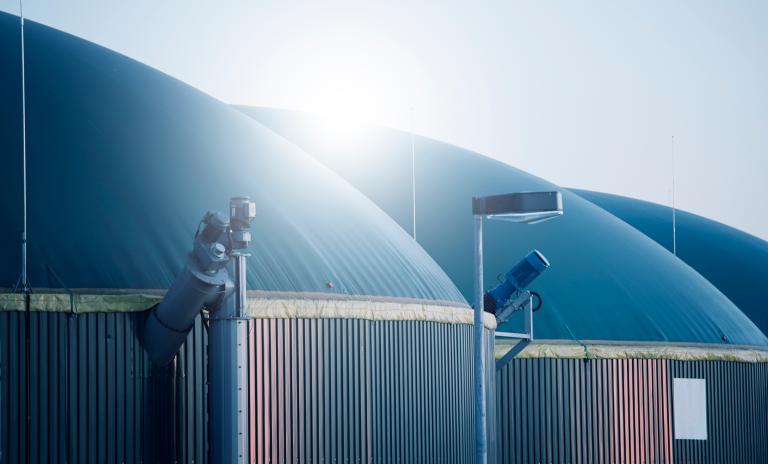Sustainable aviation fuels are crucial in Italy for reducing the carbon footprint of the aviation sector, aligning with the country's commitment to environmental sustainability and climate goals.


Biomethane: opportunities and threats in Southern Europe
State of the art of biomethane development in Italy, Spain and Portugal
"Italy is nurturing a thriving competitive landscape for biomethane production and consumption, driven by robust government support, agricultural abundance, and a commitment to environmental targets"
Leveraging waste-to-energy solutions is essential for addressing greenhouse gas emissions amid increasing waste and energy needs. Within this context, biomethane emerges as a crucial player due to its emission-saving potential, contribution to energy independence, and supportive regulatory frameworks. Europe is poised for substantial growth in this sector and in this document, we call for a concerted effort from stakeholders specifically across Italy, Spain, and Portugal to understand their respective regulatory landscapes, secure quality feedstock, engage with technological partners, and adopt advantageous commercial models.
The world is experiencing significant changes in waste generation and primary energy consumption due to population growth and rising GDP per capita. These changes are happening at different rates across countries, with Asia and Africa expected to become the largest waste producers by mid-century. Asia will also become the largest consumer of primary energy, contributing to a 50% increase in global consumption compared to 2020. The resulting increase in greenhouse gas (GHG) emissions underscores the need for improved waste management and waste-to-energy solutions. Europe has significant potential for biomethane production, aiming to reach a production target of 35 billion cubic meters (bcm) by 2030, as outlined in the REPowerEU initiative. Though green alternatives to natural gas are in high demand, the ability to meet these targets hinges on two key factors: regulatory support and feedstock availability.

"Spain's biomethane market is still in its infancy, relying primarily on private bi lateral contracts, but the development of new plants suggests a promising outlook for rapid expansion."
Biomethane's key contribution to the European 2030 vision
In 2020, the European Green Deal set the stage for the EU's ambitious green transformation , with member states committed to reducing emissions by at least 55% by 2030 compared to 1990 levels. Just a year later, in 2021, the EU increased its renewable energy targets from 32% to 40% by 2030, emphasizing the need for diverse climate solutions, including biomethane. The energy crisis in 2022 , driven by geopolitical tensions, further accelerated the EU's shift towards renewable energy. The REPowerEU plan emerged with the bold objective of ending reliance on Russian fossil fuels by 2027 and increasing the renewable energy share to 45% by 2030.
Europe has significant potential for biomethane production. The Renewable Energy Directive (RED III), effective from November 2023, sets an EU-level renewable energy target of at least 42.5% by 2030. According to Gas for Climate, about 85% of biomethane production by 2030 will come from agro-industrial feedstock. Thus, biomethane is expected to play a pivotal role in the EU's green transition, harnessing Europe's ample production capacity and helping to secure a sustainable and independent energy future.
Critical Success Factors for Biomethane Projects
-
Success in biomethane initiatives depends on efficient feedstock management, robust partnerships, and agile business models. These factors are crucial for the project's financial viability:
- Feedstock management, both during project setup and ongoing operations, is the most critical phase. It entails choosing the right location and ensuring a reliable supply of high-quality feedstock. Effective business development and procurement strategies, including partnerships with farmers and industrial players, are essential for securing a stable feedstock supply. These partnerships can also address digestate management, reducing storage costs and transport expenses.
- An effective business development and procurement strategy is essential for both greenfield initiatives and M&A growth, focusing on creating a partnership ecosystem. The goal is to secure agreements with farmers and industrial players for a reliable supply of high-quality feedstock.
- Efficient plant operations and maintenance are vital for maximizing production efficiency. Rapid and comprehensive service responses can significantly impact initial capital expenditures (Capex) and profitability.
Italy’s biomethane market: emerging opportunities and regulatory support
Italy’s biomethane market is in its early stages, showing great promise due to supportive national policies and incentives like the Decreto Biometano. This regulation facilitates the conversion of existing biogas plants into biomethane production hubs and encourages new projects. The favorable regulatory environment offers significant opportunities for reducing emissions and enhancing energy independence. However, challenges such as feedstock availability and navigating regulatory complexities must be strategically managed for sustainable market growth.
"Biomethane is a cost-effective path to help Portugal achieve its decarbonization targets"
Spain's biomethane future supported by roadmap and EU investments
Spain's biomethane sector is emerging, underpinned by a national roadmap and EU regulations. By March 2024, Spain had 13 biomethane plants generating around 0.5 TWh of power, mainly from agri-industrial facilities. The country aims to increase biogas production to 20 TWh annually by 2030, supported by EU Next Generation funds. Active trade in Guarantees of Origin (GOs) enhances economic sustainability. However, the absence of Feed-in-Tariffs presents challenges that require strategic planning and adaptability.
Significant growth opportunities for Portugal’s biomethane market in biogas and feedstock
Portugal's biomethane market is in its infancy, driven by the National Action Plan for Biomethane. With around 60 biogas plants capable of nearly 1 TWh of biomethane annually, the agricultural sector and waste management systems provide ample feedstock. Despite significant growth potential, challenges include the need for stronger financial incentives and a more robust regulatory framework. Major energy players' investments are essential for scaling up production and achieving commercial viability. Strategic initiatives and investments are crucial for unlocking the market’s potential.
To gain further insights into the biomethane industry across Europe, particularly in Italy, Spain, and Portugal, please download our full report.
Register now to access the full publication and explore the opportunities and challenges of biomethane development in Italy, Spain, and Portugal's markets. Furthermore, you get regular news and updates directly in your inbox.

_person_144.png?v=770441)


_tile_teaser_h314x380.jpg?v=1026895)

_person_320.png?v=770441)


_person_320-2.png?v=770441)

